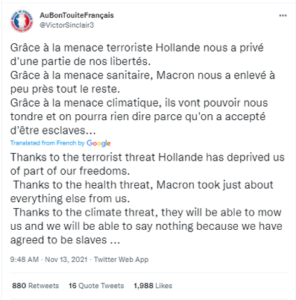As part of the Green Wedge Project, the Green Wedge Tracker gives you a monthly overview of the social media climate conversation in 8 European countries.
November 2021
- As anticipated in our October tracker below, COP26 is November’s top conversation at the EU and national levels. This suggests growing reach and relevance, but the conversation has not been constant nor long lasting.
- Both as part of the COP26 conversation and various national conversations, this month has been punctuated by the blaming of elites, and accusations of hypocrisy against elites by the public–especially in light of the climate crisis. We seem to have reached a peak in the public’s growing mistrust towards elites and governments.
Most Popular Hashtags
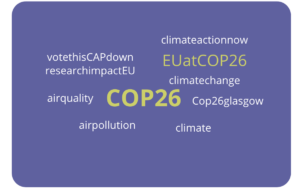
Key Twitter Events

- 1-2/11: The first few days were led by strong messages from the EU Commission in order to set and communicate its ambitions for the European Green Deal.
- 17/11: Multiple announcements:
- Announcement of new rules to help stop global deforestation and forest degradation following the promise at COP26
- EU soil strategy presented to increase soil carbon in agricultural land, to fight desertification, and restore degraded land.
- 18/11: EU cleanair forum and European Antibiotics Awareness Day.
The Conversation in Numbers
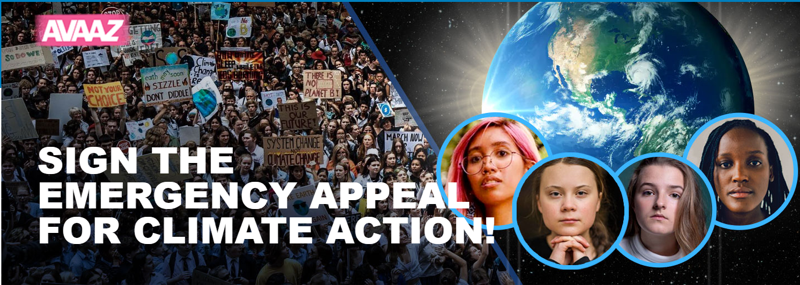
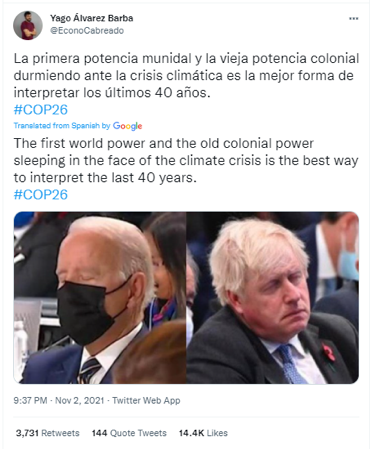
Top tweets highlight double standards: rules for the elite compared to the restrictions imposed on the general population. This is especially the case when it comes to the climate impact of a private jet trip for a leader going to COP26 vs the guilt regarding the general carbon footprint of a middle-class citizen. The message was that elites decide and enforce, but only the general public has to play by the rule and pay. Although this point has been raised in all countries, Poland made the point particularly stridently and visibly.
Focus on Key National Discussions
FRANCE
Elites vs People
- Both radical right and radical left have instrumentalized the disconnection and gap between the elites and the general public this month.
- The radical left has raised the hypocrisy of Macron at COP26 and the gap between his message and his actions for climate.

- Far-right (Rassemblement National) leader Florian Philippot received broad support in his amplification of the divide between the elites and the general public when he pointed out the 50km fight of EU president Von der Leyen at COP26.

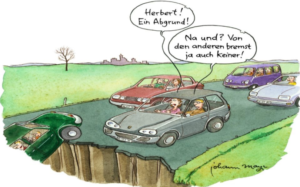
Herbert! Ein Abgrund / Na und? Von den anderen bremst ja auch keener
Herbert! An abyss / So what? No one else is braking either
ITALY
An insight in Italy’s conspiracies and extremism
- Some of the Italian conversation is clearly grist to our mill that the populist right is linking Covid and climate policy (as well as any other emergencies) to make the argument that this is a vast European conspiracy to undermine the rights and freedoms of ordinary citizens – as evidenced by these tweets by sovereigntist Gilberto Trombetta and, Brothers of Italy co-founder Guido Crosetto.
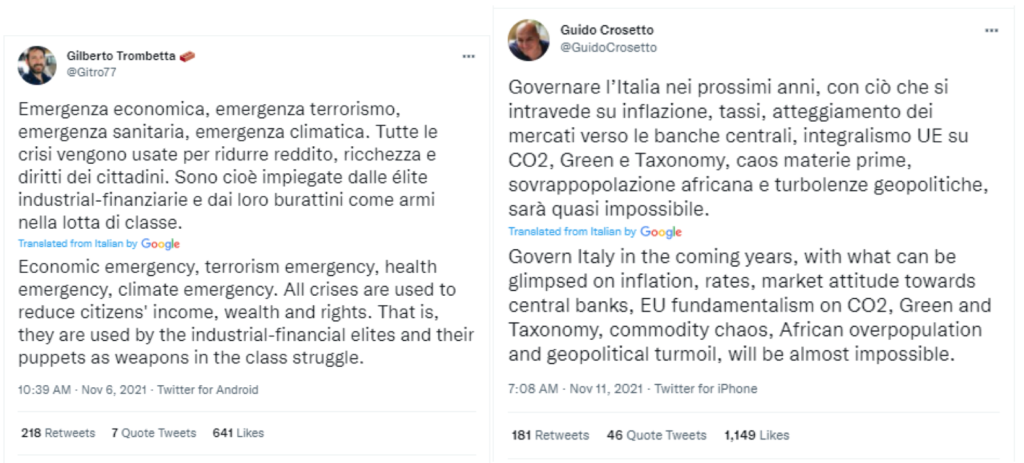
POLAND
Backlash on coal
- With both COP26 and the Fit for 55 package aiming to phase out coal, many Polish voices are standing against these agreements (see Summer, September, October trackers).
- The pledge of the Polish government to abandon coal at COP26 – despite its own promise not to – was seen as a betrayal by part of the public which will further exacerbate the loss of political and energy sovereignty. This is made worse by the fact that some countries did not sign it.
- The #Fitfor55 package is similarly seen as restrictive and disproportionally affecting people’s access to energy at affordable prices. Some in the general public still hope that the package can be vetoed.
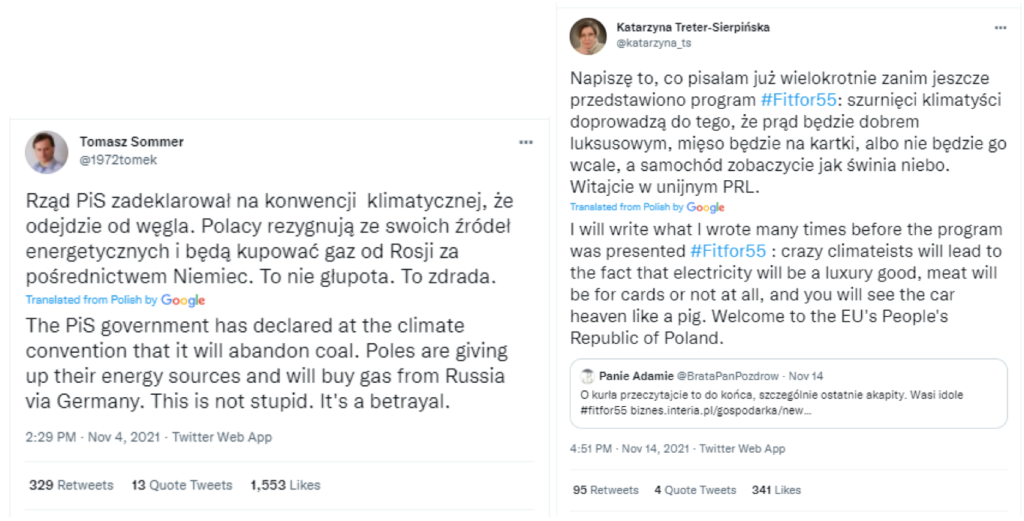

October 2021
- Largely invisible in national discussions until the last week of October COP26 nevertheless topped the list of country conversations. But the late engagement with the topic damaged the image of the summit in its run-up. As a result, the conversation focused on the hypocrisy of leaders and the gap between their action and their messages. Our November tracker takes an in-depth look at the COP26 conversation.
- In October the discussions on energy mix, the resurgence of the debate on nuclear and the growing opposition to renewables are striking across Europe in light of the energy crisis and the #Fitfor55 European climate plan.
- Poland and the EU are on a collision course on multiple fronts: long-simmering arguments over what the EU interprets as mounting attacks on the rule of law are entangled with the Commission’s threat to withhold the release of recovery package funds for Poland. The two initially separate issues are now running simultaneously in the social media conversation and gaining traction across Poland’s polarised political spectrum.
Most Popular Hashtags
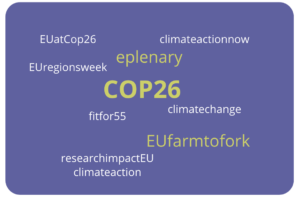
Key Twitter Events

- 11-14/10: EURegionsWeek towards a just transition across Europe.
- 18/10: EU Campaign in collaboration with UEFA promoting the EGD and its benefits, linking it to the global effort at COP26. It uses #EveryTrickCounts to highlight small daily acts to save the planet.
- 20/10: European Parliament approves the EU #FarmtoFork strategy for more sustainable food and farming.
The Conversation in Numbers
- Visibility of COP26 as part of the EGD discussion remains low. COP26 was only mentioned sparsely through a few dozen tweets a day before the EGD campaign on 18/10. The campaign however only managed to slightly increase the visibility with 100 retweets per day. This further highlights the general public disconnection from both multilateral discussions and EU decision-making and continues to decouple it from climate action. Despite trying to capture public interest through its joint campaign around football, they haven’t effectively managed.
- Over 40% of the EGD discussion on COP26 was led and relayed by EU institutions and related organisations after 18/10–this was still overwhelmingly an institutional discussion.
- 84% of the #Fitfor55 conversation is naturally happening in English, but surprisingly its second language is Polish (11%). In most discussions French, German, Spanish and sometimes Italian come far ahead of Polish. This reflects the on-going concerns of the Polish population on the impact of the EU Fitfor55 plan on energy prices, energy independence, energy jobs, and political sovereignty (and probably its mounting frustration with all things EU given the Rule of Law argument currently raging).
#EventOfTheMonth: #COP26
COP26 was virtually invisible in national discussions apart from in the last week of October. The momentum picked up only a few days before the actual start of the event.

- Early tweets on COP26 were broadly negative reflecting the lack of faith in multilateral discussions (G20 and COP26), emphasising the hypocrisy of leaders who discussed climate and lecturing the public as they travelled in fleets of cars and planes.
- This illustrates that more and more people became interested in the fate of climate during COP26. However, early negativity hints at people’s lack of faith in the system and the ability of leaders to deliver climate action through multilateral negotiations.
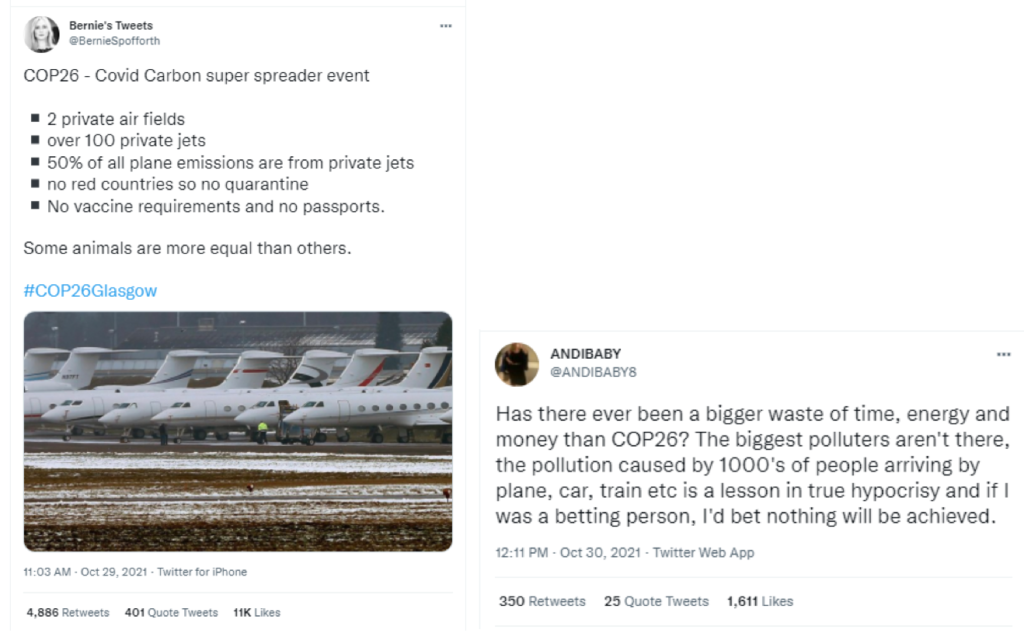
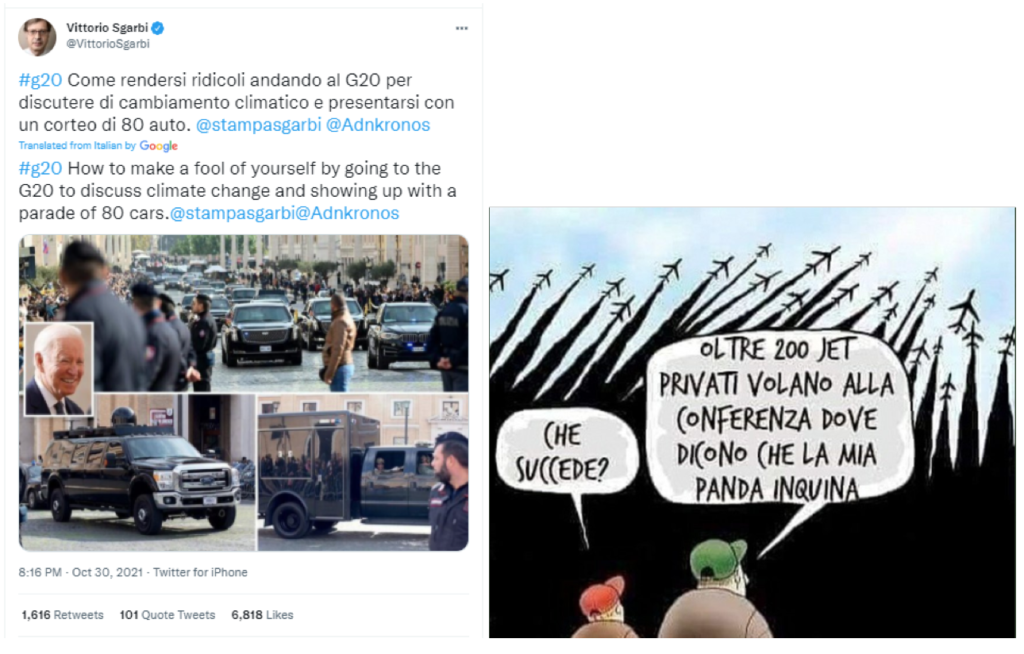
Focus on Key National Discussions
FRANCE
Wind 0 – Nuclear 1
- We can see the the movement against wind turbines gaining traction and feeding the the re-emergence of the discussion around nuclear. After Stephane Bern (May and September Tracker) it was the turn of Jean-Pierre Pernaut, a well-known retired TV journalist, to get involved in the movement against wind turbines and increase its visibility. The stress was generally on landscape impact, fauna/flora disruption, the cost of dismantling, inefficiency and price.
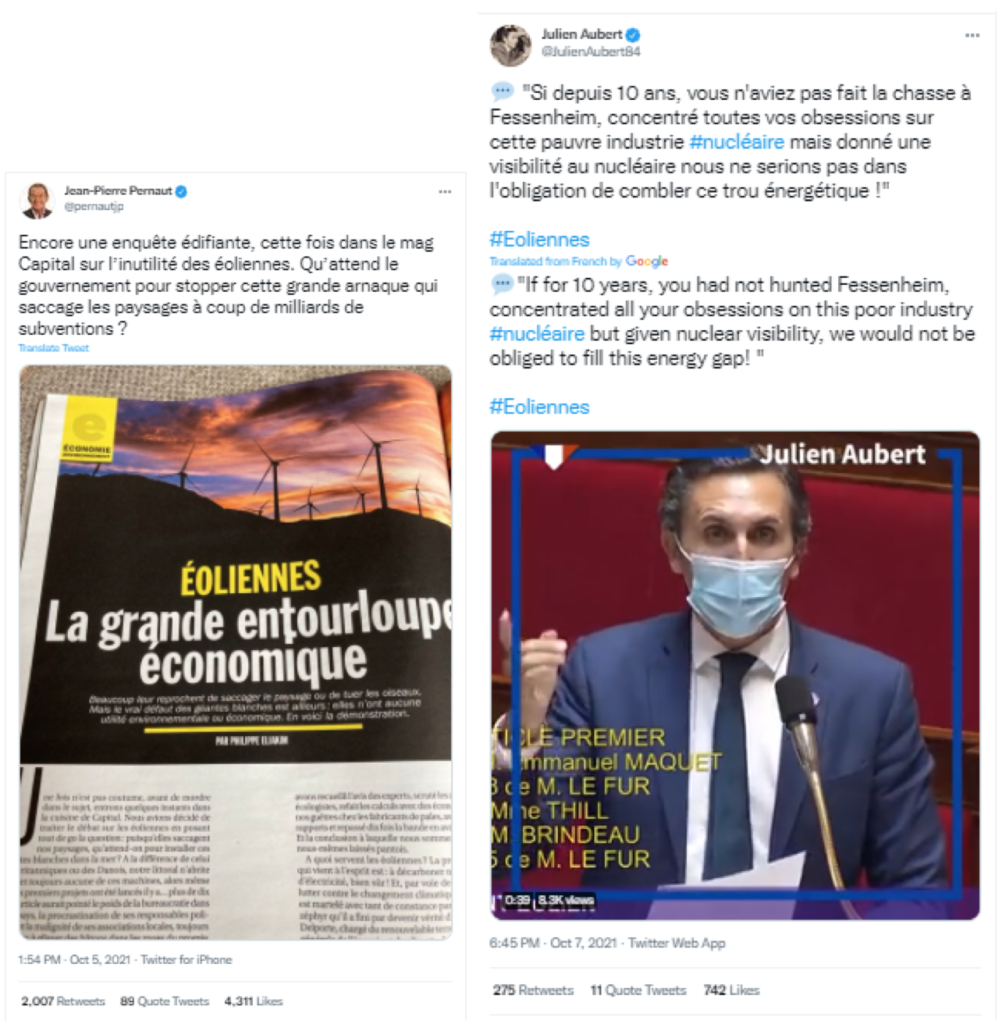
- A heavily polarized debate around nuclear energy has now been both mainstreamed and politicised as part of the presidential campaign. Worth noting that top tweets on nuclear highlight the need for nuclear as a transition measure to reach climate goals, and achieve energy independence and low prices (+ highlight the error in closing existing nuclear plants and committed to the closure of more).
Government and industrials growing responsibility on climate
- In a successful second round of the #AffaireduSiecle, the French constitutional court condemned the government to pay for the consequence of its climate inaction.

- Research found that French oil giant, Total, knew about climate change but openly decided to slow down action to address climate change.
POLAND
#Fitfor55 package and the growing faultline between Poland and the EU
- As raised in last month’s tracker (September Tracker), there is a growing Polsih hostility towards the EU that is gaining bth traction and acceptability across the Polish conversation. The Polish conversation takes issue with mine-closure and opposes the European Green Deal for its impact on Poland and its people.
- Very strong language is used to describe the European Green Deal—a crazy, mad plan to impoverish the country, with the EU using blackmail to impose its will on Poland, reduce its sovereignty and political autonomy and increase its energy dependence.
- This view is no longer a niche view, but rather becoming mainstream and expressed both in the Polish parliament and the European parliament.
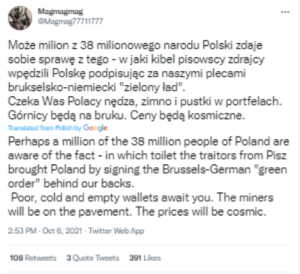
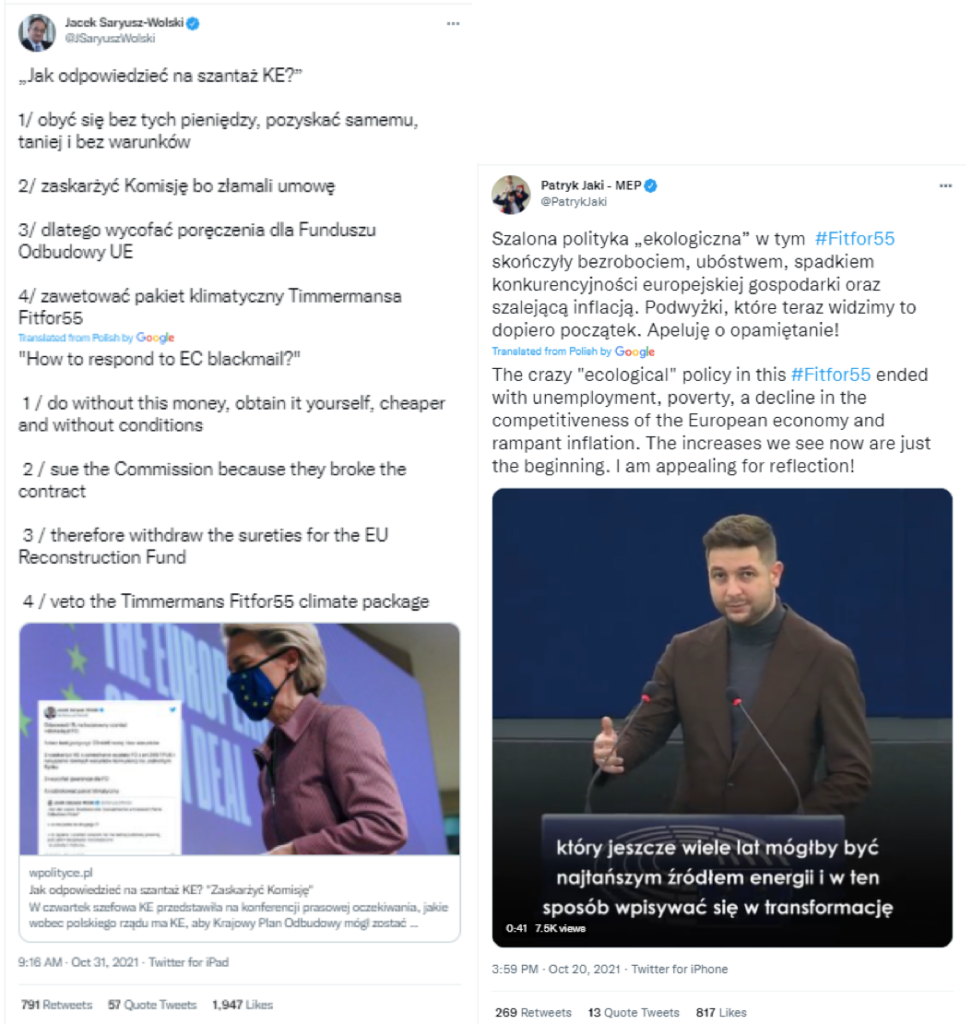
GERMANY
Coalition negotiations facing a transport and energy dilemma
- Despite more and more people (60%) agreeing with implementing a speed limit #tempolimit on highways as a climate-friendly (and safety) measure, the coalition talks between the SPD, Greens and FDP didn’t seem in favour of such a measure. This is at the top of German debate this month: The Greens, keen to signal their pragmatism, did not want to make it a condition to coalition formation.
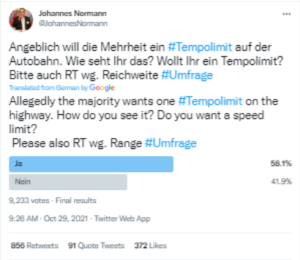
- The government is criticized for its contradicting policies. In addition of increasing the price of public transport when the world aims to reduce combustion engine fleet and petrol price is high, it is also limiting the development of both fossil and renewable energy limiting the availability of energy and impacting its price.
- The far-right is being proactive in criticising governmental policies and taxes to facilitate the development of renewables and are trying to represent the “truth” that mainstream parties are afraid to admit by supporting nuclear.
ITALY
Climate change or infrastructure?
- During Catania and Sicilia’s floods towards the end of October, many stressed that these are not due to bad weather but are a real consequence of climate change and call for fast action on climate. Others, potentially slightly more sceptical, perceive climate change as an easy diversion of responsibility when the government is to blame for its lack of investment in the hydrogeological management system.
SWEDEN
Growing negativity against the Greens
- The top tweets on climate this month in Sweden raise many of the contradictions and disagreements with the Green party, blaming them for wanting to borrow 1,000 billion (SEK) for climate and raising taxes, for its perceived support for coal and gas import, for their opposition to nuclear, for the restriction of freedom that their policy represent.
The monthly tracker is brought to you by our Climate & Protest Programme Director Cloé Ragot.
See you next month !
Previous Trackers







